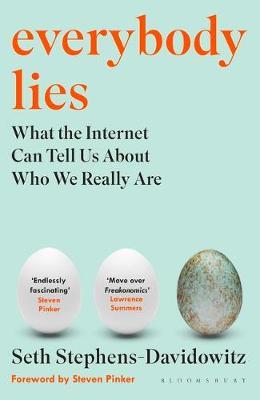
Most people, when quizzed by surveys or social scientists give an account of the best version of themselves. In other words, they lie.
But people do not lie to Google. In fact, people have an incentive to be honest so they can get the information they need.
This fact lies at the heart of Everybody Lies, a new book by economist Seth Stephens-Davidowitz.
He analysed Google Trends over five years and got a different picture of people than one might get from other sources.
He discovered, for example, that there are more searches for porn than weather.
(In surveys 20% of men and 4% of women admit to watching porn, which is hard to reconcile with the data on Google Trends.)
He also found out that if you ask people in a survey whether they will vote in an upcoming election 50% of people who don’t vote say they will.
On Google, however, you can predict with great accuracy where turnout for an election will be high based on the amount of search queries for how to vote and where to vote.
Google Trends can also predict who is at risk from suicide. People about to commit suicide Google search isturbing terms such as ‘How to kill yourself’, ‘Kill yourself’, ‘Suicide’, ‘Commit suicide’. (There are 3.5m searches for suicide in the US every month and 4000 suicides).
Stephens-Davidowitz. also discovered that if you ask people in a survey ‘Are you a racist?’ 99% of Americans said no. But on Google, people are making racist searches with disturbing frequency. And Stephens-Davidowitz. found searches that used the n word (a racial slur) got a lot less, not as you move from the South to the North of the US but from the East to the West.
Nate Cohn of the New York Times subsequently discovered that use of racist search terms on Google had a higher correlation to support for Trunp in the Republican primary than any other factor.
Stephens-Davidowitz found people are much less honest on Facebook. He found Facebook data did not correspond with reality.
For example, the trashy, supermarket tabloid National Enquirer sells three times as many copies each year as the upmarket Atlantic. But on Facebook, the Atlantic receives more likes than the National Enquirer by a factor of 45. People clearly want their friends to think they are intellectual.
At the same time, according to Facebook data, the most popular completion of the sentence ‘My husband is” looks this this: ‘My husband is the best’. On Google, it is ‘My husband is gay.’
Stephens-Davidowitz. also found that when there were more searches for phrases such as “kill Muslims” there were, days later, also more hate crimes against muslims in the US. (There are about 12,000 searches of Kill Muslims every year and about 11 murders of Muslim Americans)
After the attacks in San Bernadino in 20115, when two US Muslims shot up co-workers, President Obama gave a speech suggesting Americans not give in to prejudice.
Checking Google searches during the speech minute by minute, it seemed it did nothing to stop Islamophobic searches. In fact they went up. More people were searching ‘Kill muslims’.
However, at the end of Obama’s speech he said US Musilms were also sporting heroes and men and women who would die for the US. For a week afterwards the most searched terms regarding Muslims were for Muslim soldiers and Muslim athletes.
What Google searches proved was that lecturing people – telling them what they should or shouldn’t do – did not work. What did work was provoking people’s curiosity, changing the way they feel.
Google Trends represents an unprecedented window into the human mind, revealing more and more areas of human behaviour that can now be measured by science.
Posted in: Infographic of the day | Leave a Comment


